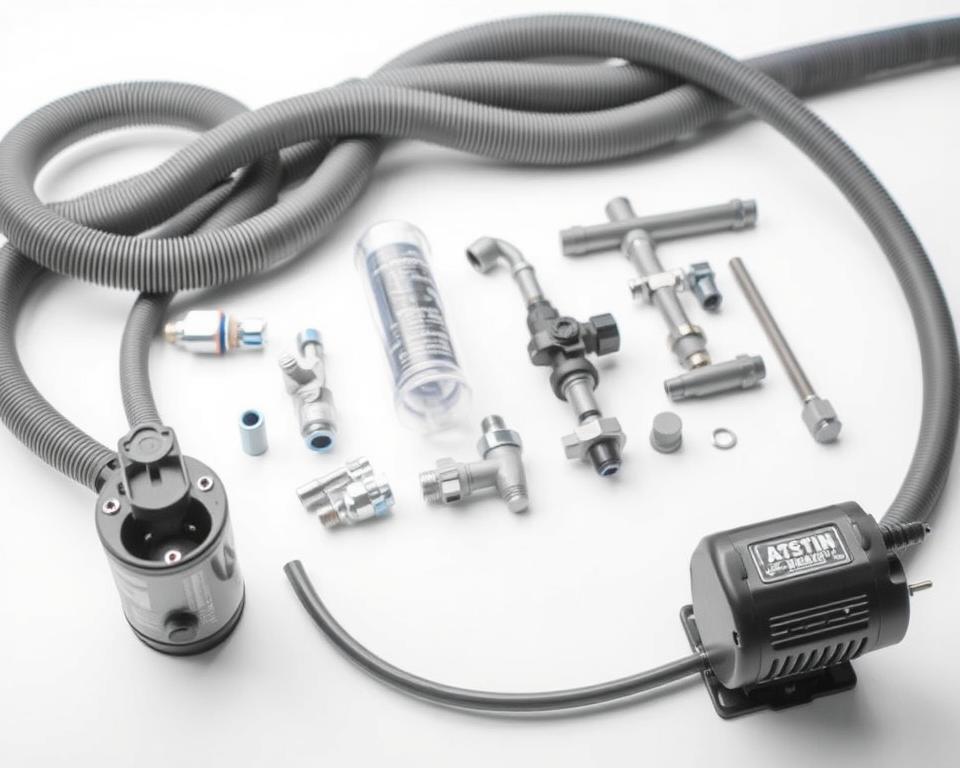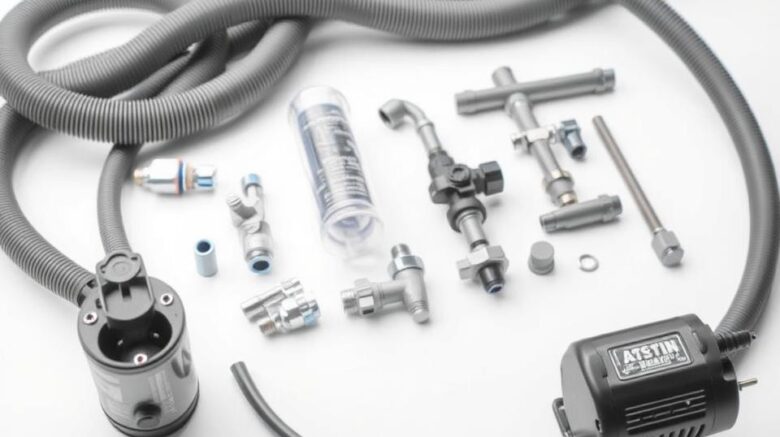Septic System Pumping
Do you ever think about how often you should set up septic system pumping so you can dodge costly malfunctions? With over 20 percent of U.S. households depending on septic systems, comprehending their maintenance is vital. Pinpointing the right time to order a septic tank service is key to its durability. Additionally, there are economical septic pumping solutions that provide high-quality functionality while staying on budget. This guide covers critical upkeep advice helpful for every homeowner.
Core Takeaways
- Scheduled septic system pumping is essential for smooth functioning.
- Identifying the signs that show the need for service can prevent major issues.
- Choosing professional septic system pumpers guarantees top-quality maintenance.
- Cost-effective septic pumping choices are available for homeowners.
- Routine inspections support peak system performance.
Understanding Your Septic System
A septic system performs a vital role in processing household wastewater, made up of several important components that operate in unison. The main drain line channels wastewater from your home to the septic tank, where the process starts. In the tank, an underground chamber, solids settle at the bottom, and bacteria decompose these solids, treating the waste thoroughly.
The clarified liquid outflow then flows from the septic tank to the distribution box, where it is distributed evenly across the drain field or leach field. Here, the soil carries on with the filtration, continuing to purify the wastewater. Comprehending the functions of these septic system parts is critical. It enables homeowners to supervise and upkeep their systems effectively.
Being aware of how your septic system functions allows you to take preemptive maintenance measures. It’s wise to have regular appointments with professional technicians of septic systems – RV water tank and pump. They offer crucial insights for best performance of your system. These professionals assist in scheduling the required pump-outs and checks. This diligence can considerably prolong your septic system’s lifespan.
Importance of Septic System Maintenance
Maintaining your septic tank on a routine basis is key for homeowners who wish their system to remain reliable. A well-cared-for system delivers peace of mind and secures your property’s value. Without adequate care, you’re risking system breakdowns and health dangers.
Selecting a top-notch septic pumping service is crucial. They provide timely inspections and pump-outs, clearing out sludge and scum buildup. If maintenance is overlooked, emergency pumping may be required, which is expensive.
Adhering to a regular maintenance plan is smart. It involves professional evaluations and regular pumping. This preventative measure helps avoid urgent issues, creating a safer living environment for everyone.

How to Tell Your Septic System Requires Service
Staying mindful of septic system issues can avoid costly repairs and major damage. Common signs show when your system needs a check. These comprise:
- Slow drains throughout the house
- Pooling water in the yard above the drain field
- Bad odors near the septic tank or leach field
- Remarkably thick grass growth in particular areas of your yard
These clues could indicate problems that might result in your system failing. Acting quickly is essential. Calling in septic pumping experts for an inspection assists. Early intervention avoids small issues from growing into serious ones. Moreover, consistent upkeep ensures your system works well and lasts longer.
Optimal Approaches to Septic System Pumping
Correct pumping of your septic tank is essential to avoid expensive clogs and backups. It’s necessary to determine the right frequency for maintenance. Homeowners should usually schedule pumping every 2 to 5 years, based on the tank’s size and household wastewater levels. Frequent use of garbage disposals may require more frequent pumping.
Engaging qualified pumpers means your tank gets a full clean and check-up. During pumping, specialists look for any issues, such as broken baffles. Finding these problems at an early stage prevents bigger expenses and inconveniences later. Regular pumping schedules and expert help ensure your septic system’s smooth operation.
Routine Inspections for Optimal Performance
Periodic inspections are crucial for your septic system’s efficiency. Septic system inspections reveal early issues before they worsen. Experts advise inspections every three to five years, depending on system size and household usage. This sidesteps expensive fixes.
Holding maintenance records is important for documenting your system’s condition. These records provide insights into previous inspections, repairs, and the right time to schedule septic tank cleaning services. With this information, organizing for future upkeep becomes more straightforward, keeping septic systems in optimal shape.
Frequent inspections and detailed record-keeping not only boost system efficiency but also extend its life. This strategy protects the environment and the investment in a safe, operational home.
| Inspection Type | Recommendation Frequency | Benefits |
|---|---|---|
| Visual Inspection | Annually | Identify surface issues |
| Professional Inspection | Every 3–5 years | Assess functionality and detect problems |
| Septic Tank Pumping | Every 3–6 years | Prevent overflow and system failure |
Water-Saving Habits for a Healthier Septic System
Mindful water use is key for keeping your septic system robust. It not only supports the environment but also improves the performance of your home’s plumbing. By practicing simple, yet effective, conservation methods, homeowners can decrease wastewater.
Stagger your laundry activities over the week instead of running back-to-back loads. This helps the septic system to process water better and prevents tank overflow. Installing low-flow fixtures in your kitchens and bathrooms leads to considerable water savings, retaining the water pressure up while lowering the flow rate, thus diminishing the amount of wastewater produced each day.
Promptly fixing leaks is another practice to support your septic system. Even a small leak can lead to a large waste of water, overburdening the septic system. Through regular inspections and repairs, you contribute significantly to the system’s efficiency.
Focusing on water conservation isn’t just beneficial for your septic system; it’s also a step towards eco-friendly living. Integrating such practices into everyday habits helps both your household and the planet.
Managing Household Waste Correctly
Homeowners play a vital role in keeping their septic system’s health by handling household waste properly. It’s essential to avoid disposing of non-biodegradable items like wipes, plastics, and other harmful products in the system. These items can trigger clogs, causing pricey repairs and a reduction in efficiency.
Composting food scraps and organic materials is a advantageous alternative to throwing them in the trash. This practice markedly reduces the amount of solid waste entering the septic tank. Focusing on biodegradable waste disposal supports the ecological balance needed for effective waste management.
It’s important to monitor what goes down the drains. Non-decomposable items can necessitate more frequent septic tank pumping. By understanding and following correct waste disposal methods, you can secure a more efficient and long-lasting septic system.
Choosing Septic-Friendly Cleaners
The health of your septic system depends significantly on your choice of cleaning products. Selecting septic-safe cleaning products is essential. These products shield the balance of beneficial bacteria that digest waste. Many standard cleaners include harmful chemicals that endanger this balance, resulting in costly repairs or system failure.
Homeowners should look into natural alternatives that are both effective and environmentally friendly. Common household items like baking soda, vinegar, and lemon juice are excellent choices. These natural cleaners are not only effective but also support your septic system’s health.
Keeping away from products that contain antibacterial agents and chlorine bleach is vital. Such substances harm the beneficial good bacteria, undermining your system’s functionality. By picking sustainable products, you ensure both the efficiency and longevity of your septic system.
Bacterial Health and Your Septic System
Bacteria carry out a key role in keeping your septic system healthy. They break down solids naturally and enhance nutrient processing. A lack of healthy bacteria can lead to system failure, creating expensive repairs.
Homeowners can improve their system by introducing organic additives. These products raise beneficial bacteria, making waste decomposition faster. It’s important to opt for organic additives that are advantageous, not harmful, to the septic environment.
A strong bacterial community is essential to a septic system’s longevity and efficiency. It prevents solid buildup and reduces the need for regular pumping. Prioritizing bacterial health creates waste management more effective and eco-friendly.
As a Final Point
Septic system care is essential for the longevity and functionality of your home’s wastewater system. Following essential maintenance tips sidesteps expensive repairs. Understanding routine pumping and inspections is key. This guarantees your septic system keeps in excellent condition.
Learning about your septic system’s operation and best practices in water and waste management is important. Engaging professionals like All in Sanitation delivers expertise. This contributes to your septic system’s long-term health and provides confidence.
Putting effort into proper septic maintenance today delivers future benefits. It protects your home and boosts your family’s quality of life. Emphasizing septic system care provides assurance with a well-maintained system.
